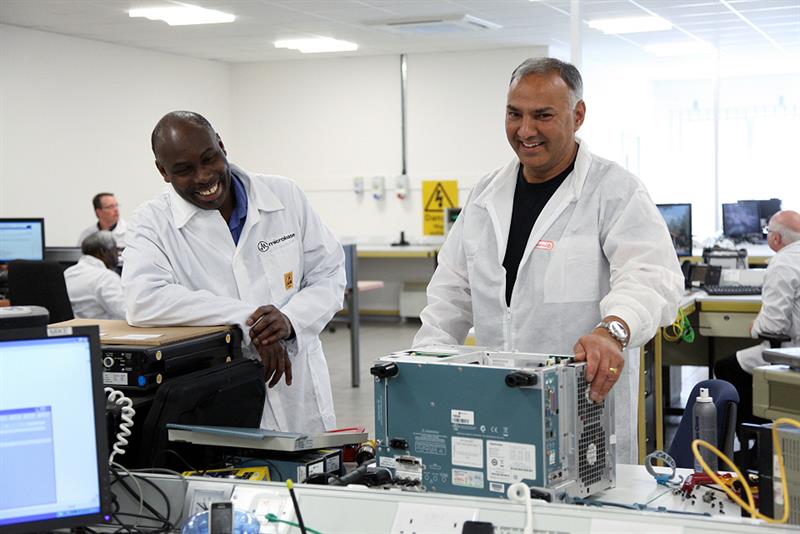Traditionally the renting or leasing of test equipment was suitable for customers with short-term requirements or who didn’t have the budget to buy test instruments. Today, companies in industries that are evolving rapidly are turning to rental specialists, especially when instrument obsolescence is becoming increasingly important.
Research from Frost & Sullivan suggests the share of rental and leasing services in the test and measurement industry is growing strongly and currently accounts for a third of the total market revenues.
While different industry sectors have different requirements, demand for rental and leasing has tended to be strongest in the telecommunications market, boosted by the deployment of 4G networks fibre optic networks moving to 40G and from growing investment in mmWave and 5G technologies.
Whatever the market, those supplying test and measurement equipment have to ensure their portfolio meets changing customer requirements and, as technology evolves more quickly, companies faced with budgetary constraints are having to think more creatively about how they acquire test equipment – does it address the needs of their latest development project, does it support the latest standards and in the light of rapid developments driven by the Internet of Things does it offer sufficient performance?
The functionality and cost of software is another challenge that needs to be addressed. As the use and type of software increases, so variations in the type of test equipment required have exploded. In addition, equipment is becoming more configurable, adding further pressures when it comes to providing the correct test services and support.
For rental and leasing companies, the key challenge is not only to be able to provide the right equipment, but also the most up to date devices that meet changing testing requirements.
Microlease, which accounts for more than 70% of the UK’s rental market, is looking to address changing market requirements by providing a much broader portfolio of services.

George Acris, head of business development, pictured left, said: “There’s a lot going on in the test and measurement market and, in response to changes we’ve seen in research and development, manufacturing, installation and maintenance, we have moved to become what I would describe as a total solutions provider. That means we now cover rental, leasing, the selling of equipment and more recently distribution, together with asset management.
“In effect, we act as a consultancy that looks to help customers identify the right product for their test and measurement requirements. Whether for design or verification, installation or production, companies can’t afford to acquire equipment that ends up not being used efficiently or simply becomes obsolete as technology evolves,” Acris continued.
Asset management has become an important element of the Microlease portfolio. “We have developed our LEO software and demonstrated that, through better asset management, companies can not only save money but can boost utilisation significantly,” said Acris. “The larger the inventory, the bigger the savings.”
As a result of better asset management engineers can find their test equipment more quickly, redirect spend on test equipment to leading edge technologies and even identify and then sell assets that are no longer required.
“By better understanding their assets companies can then make more informed decisions as to what assets they need and then whether to purchase or rent them,” Acris noted.
A competitive market
While Aspen Electronics primarily sells test equipment, it also rents specific lines.
“While the market remains flat overall, it is very competitive,” said managing director Howard Venning. “That’s a given when you consider there are now 26 companies supplying oscilloscopes into the UK market and the routes to market are changing rapidly. Keysight has announced, for example, that along with traditional distributors like RS and Farnell, they will now be using Amazon to source its equipment.

“A lot of test and measurement equipment is now little more than a commodity, which means cost is the priority for design engineers. If the test and measurement market is reaching saturation point, I would expect the cost of test equipment to come down even further.”
Microlease has responded to this by moving into distribution itself. “We’ve worked to extend the range of services we offer and, in the face of cheaper products coming on to the market, have developed a distribution element to our business,” explained Acris.
“We manage thousands of lines and acting as an authorised distributor was a logical next step,” he continued. “Distribution services form a key growth driver for Microlease. We work closely, for example, with Keysight and Viavi Instruments in the UK, targeting that part of the market where cost is seen as being far more important and where test equipment is perceived as a commodity. We recently signed GW Instek, adding further to our ‘economy’ range of test equipment and opening opportunities in the education market.”
“Buyers,” according to Venning, “want value for money and are looking to acquire multiple capabilities in each item of equipment. More and more, we are seeing instruments being consolidated.”
However, Acris doesn’t see this as a threat to the economics underpinning the rental market. “No, not really. Companies are addressing the needs of a specific part of the market; one which tends to buy test and measurement equipment. More OEMs are moving into that space and where multiple devices replace traditional devices, there will be implications for the number of units being sold. But most companies will not want to buy a stock of equipment only to find that, in a matter of months, technology has moved on and the test equipment they have acquired has become obsolete.”

The challenge for rental companies is that they are obliged to carry an extensive portfolio of equipment to match the changing needs of their customers.
“We’re constantly looking to add new lines and to enable customers to access them. We look to offer them a one stop shop that provides them with the products and advice they need,” said Acris.
“To be a ‘one-stop-shop’, companies need to buy a lot of equipment,” suggested Venning (pictured left). “Companies are having to sink serious amounts of money into providing a ‘complete’ service to meet the demands of companies in a rapidly changing market. That’s a challenge for any company, no matter their size.”
Beyond the financial costs and whether renting or buying test equipment is in their best interests, the speed at which technology is evolving is a challenge and, large or small, companies will need to invest carefully in as much test equipment as their budget can reasonably allow.













